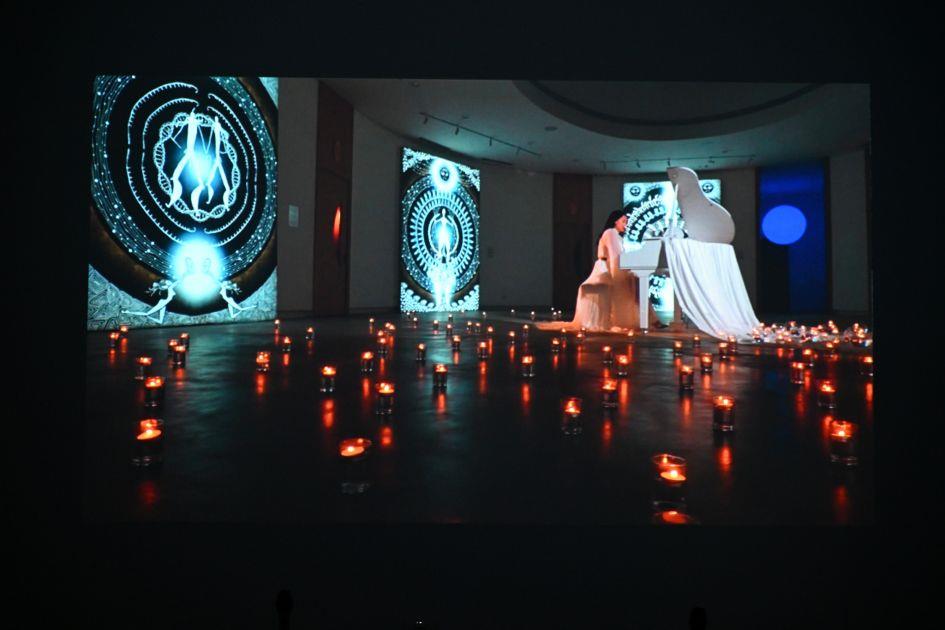
Round Table On Gobustan Held In Nine Senses Art Center
As part of the research project "Codes of Gobustan", a round table dedicated to the study of the phenomenon of Gobustan's ancient civilization has been held at the Nine Senses Art Center, Azernews reports.
Leading experts in the field of archaeology, art history, ecology, and history participated in the event.
The moderator of the round table was the director of the Nine Senses Art Center Natalia Zhukova, who spoke about the concept of the exhibition "Codes of Gobustan".
In his speech, the shaman of Gobustan Tarlan Manafov noted that Azerbaijan has a unique cultural heritage.
"A thorough study of ancient artefacts in Gobustan allows us to understand and delve deeper into the past. Throughout life, a person strives to find answers to questions about his origin and God, as well as other existential topics. Rock paintings in Gobustan were perceived as a divine manifestation. They are a true miracle," the shaman added.
Chairman of the NGO "Hayajan", an expert on forest biodiversity, Aligeydar Mammadov, in turn, offered a unique view of ancient Azerbaijani civilisations, analysing them through the prism of sacred beliefs, myths, and customs.
Local historian and head of the initiative group "Hunters for artefacts" Sabit Jojulu in his report emphasized the importance of Gobustan tamgas, the need to preserve them, include them in the register of protected monuments, as well as popularize them through tourist routes.
In conclusion, answers were given to questions of interest to the participants of the round table.
Then there was a presentation of the artistic diorama "Gobustan-3029", created by the talented photographer and director Ilkin Zafarli. This unique work is a look at Gobustan in the distant future - in 3029.
The diorama takes viewers to an imaginary reality, where the sacred territory appears in a new dimension, combining mythology, modernity and futurism. The author of the work told about the history of the creation of this work, about what inspired him to such an unusual artistic research, and revealed the secret meanings embedded in the details of the miniature.
Then the audience was shown a film by Togrul Avshar, shot in the picturesque locations of Gobustan, places of power in Azerbaijan. This film deeply explores the connection of the artist with the sacred space, showing how being in a place of power can become a source of inspiration and turns a creative person into a conductor of great energy.
Through the prism of art, the film reveals how the internal energy of the area comes to life and is transmitted to the viewer, becoming part of the great cosmic harmony.
Gobustan, a UNESCO World Heritage Site located near Baku, Azerbaijan, is a remarkable place that highlights our rich history and culture. Famous for its stunning rock formations and ancient carvings, Gobustan provides a fascinating look at the lives of the people who lived there thousands of years ago.
These petroglyphs, which depict various aspects of early human life, reveal the struggles and celebrations of our ancestors and their connection to the environment.
Gobustan State Historical-Artistic Reserve is a destination that should be at the top of any history buff's list.
The area has been inhabited for thousands of years and boasts over 600,000 distinct paintings, ranging from 20,000 years old to as recent as 5,000 years ago. In 2007, Gobustan was declared a UNESCO World Cultural Heritage Site.
Among the 6,000 drawings found in Gobustan are petroglyphs - stone and iron-age figures depicting hunting scenes, ceremonies, and rituals.
The famous explorer Thor Heyerdahl investigated the Gobustan petroglyphs and concluded that the oldest known images of a pirogue boat are found there.
He also made a sensational hypothesis about a connection between Norwegians and Azerbaijanis, suggesting that the ancestors of Scandinavians migrated from Azerbaijan.
Most of the rock engravings in Gobustan depict primitive men, animals, battle scenes, and other cultural practices.
In addition to the petroglyphs, visitors can see the musical gemstone known as Gaval Dash, which produces a tambourine-like sound when struck in various places.
Many Azerbaijani musicians have used Gaval Dash to create wonderful pieces of music.
The musical stone and the Yallı chain dance were also featured in the interval act of the semi-final of the Eurovision Song Contest 2012 held in Baku.
There is also a stone slab with a Latin inscription from the first century, left behind by the 12th Roman legion of Emperor Domitian, indicating their stay in the area.
Gobustan has been granted national status since 2006. The reserve's main goal is to safeguard the ancient rock carvings and burial mounds found in the area.
Every year, this awe-inspiring open-air museum attracts thousands of visitors from all over the world.
Legal Disclaimer:
MENAFN provides the
information “as is” without warranty of any kind. We do not accept
any responsibility or liability for the accuracy, content, images,
videos, licenses, completeness, legality, or reliability of the information
contained in this article. If you have any complaints or copyright
issues related to this article, kindly contact the provider above.


















Comments
No comment